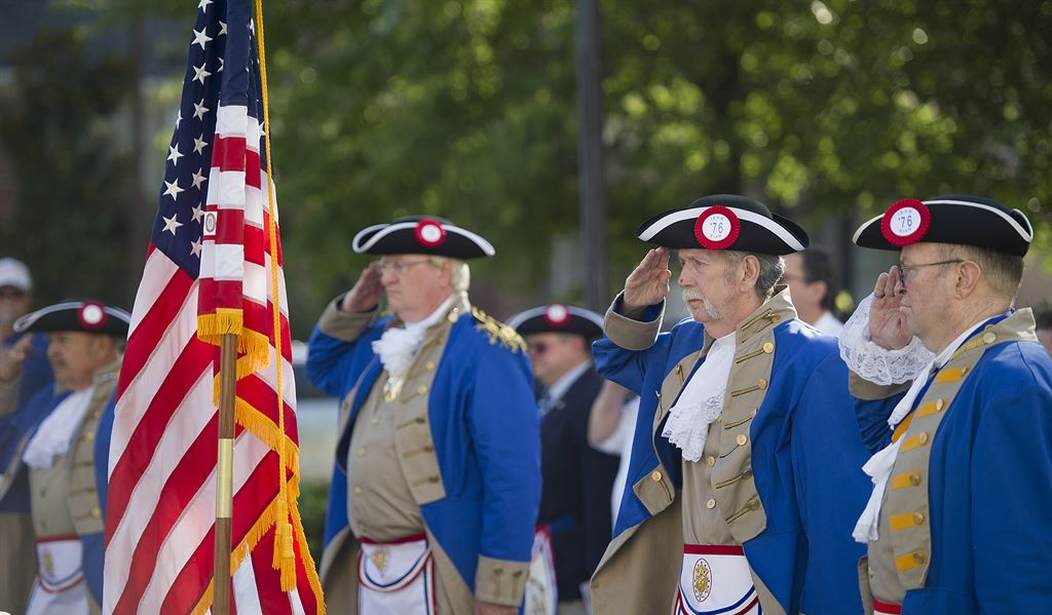From all of us here at Bearing Arms, here's to a safe and happy Independence Day to you!
In 1926, Calvin Coolidge commemorated the 150th anniversary of the signing of the Declaration of Independence in Philadelphia, and remided his audience the reason why today is so important.
It was not because it was proposed to establish a new nation, but because it was proposed to establish a nation on new principles, that July 4, 1776, has come to be regarded as one of the greatest days in history. Great ideas do not burst upon the world unannounced. They are reached by a gradual development over a length of time usually proportionate to their importance. This is especially true of the principles laid down in the Declaration of Independence. Three very definite propositions were set out in its preamble regarding the nature of mankind and therefore of government. These were the doctrine that all men are created equal, that they are endowed with certain inalienable rights, and that therefore the source of the just powers of government must be derived from the consent of the governed.
Among those rights, of course, was the right to keep and bear arms. A decade after the Declaration, as Americans were debating the new framework of government that would replace the Articles of Confederation, it became apparent that many citizens had grave doubts about the document and the potential for unchecked power on the part of the federal government. A Bill of Rights was necessary, they believed, in order to ensure that they and future generations weren't alienated from their unalienable rights. The preamble to the Bill of Rights makes its purpose clear:
THE Conventions of a number of the States, having at the time of their adopting the Constitution, expressed a desire, in order to prevent misconstruction or abuse of its powers, that further declaratory and restrictive clauses should be added: And as extending the ground of public confidence in the Government, will best ensure the beneficent ends of its institution.
Those restrictive clauses weren't aimed at the American people. They shackled the federal government, imposing "Tread-Free Zones" on Congress and the executive branch. Over the ensuring centuries those protections have at times been so weakened that they were almost non-existent, and there's rarely been a time when our predecessors weren't fighting over the scope of those rights and who could exercise them. As Coolidge said:
Governments do not make ideals, but ideals make governments. This is both historically and logically true. Of course the government can help to sustain ideals and can create institutions through which they can be the better observed, but their source by their very nature is in the people. The people have to bear their own responsibilities. There is no method by which that burden can be shifted to the government. It is not the enactment, but the observance of laws, that creates the character of a nation.
Of course, Coolidge said that in 1926, when Prohibition was in full effect and scores of Americans were making the conscious decision to violate the laws in the name of personal freedom (and a good stiff drink).
The truth is there's always been a bit of rebellion in the American DNA, especially when it comes to those laws that we know inhibit or infringe on our individual liberties. What gives that rebellious attitude its strength, however, is our ability to reform our laws. We don't have to impotently accept the edicts of kings and potentates, nor do we have to man the barricades over every light and transient cause. We the People possess the power to ensure that our rights to life, liberty, and the pursuit of happiness remain intact. Just seven years after Coolidge delivered that address in Philadelphia, Prohibition was repealed, and the ideals of the American people once again helped shape the role of the federal government.
The rebellious reformation that led to the Declaration of Independence is also an inherent part of the fight to strengthen and secure our Second Amendment rights today. We aren't standing idly by as states like California, New Jersey, and New York trample on the right to keep and bear arms. We're using the courts to overturn bad laws and restore rights once lost. And in states that are more Second Amendment-friendly we're expanding our rights.
Starting today, for example, lawful gun owners in Louisiana need not apply for permission from the state before exercising their right to bear arms in self-defense. More than half of the states in our Union have now adopted Constitutional Carry laws, while the notion of repealing the Second Amendment entirely is a suggestion offered only by the fringiest members of the gun control movement, which has decided instead to pretend that the Second Amendment is essentially meaningless.
Our rights are not yet secure, and the path forward won't always be easy. But as we celebrate our freedom from Great Britain (where carrying around a Legend of Zelda toy sword can land you in prison), we can also celebrate the progress we've made in protecting our Second Amendment liberties from government overreach and the who demand we sacrifice our own independence and rely sole on the State to keep us safe and free.








Join the conversation as a VIP Member